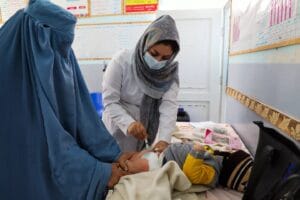IBR research team receives $2.7 million grant to study Alzheimer’s disease

Researchers at the IBR) have been awarded a $2.7 million grant over five years from the National Institute of Health’s (NIH) National Institute on Aging to support research into biomarkers of Alzheimer’s disease in adults with Down syndrome.
While disclosing this on Thursday December 3, 2020, Jennifer O’Sullivan, Director of Communications, OPWDD, stated that the award is part of NIH’s INCLUDE (Investigation of Co-occurring conditions across the Lifespan to Understand Down syndromE) project.
O’Sullivan stated that Dr. Sharon Krinsky-McHale and her team of scientists from IBR – which is the research arm of the New York State Office for People With Developmental Disabilities (OPWDD) – will spearhead the work.

She added that the project seeks to investigate conditions that affect people with Down syndrome and the general population such as Alzheimer’s disease, autism, cataracts, celiac disease, congenital heart disease and diabetes.
NIH’s National Institute on Aging and the Eunice Kennedy Shriver National Institute of Child Health and Human Development are also funding this project.
IBR and Dr. Krinsky-McHale are members of the Alzheimer Biomarker Consortium – Down Syndrome (ABC-DS), which is at the forefront of research focused on the recognition of the earliest indicators of dementia in adults with Down syndrome, and includes the University of Pittsburgh, University of Wisconsin-Madison, University of Cambridge, Washington University – St. Louis, Columbia University, Johns Hopkins University, University of California – Irvine, Harvard University/Massachusetts General Hospital, Hackensack University Medical Center, and the University of North Texas Health Science Center.
OPWDD Commissioner, Dr. Theodore Kastner, MD, MA, said, “Early diagnosis of Alzheimer’s disease is critically important. Early Alzheimer’s-related changes are especially difficult to identify in adults with Down syndrome because of variable levels of lifelong cognitive impairment.
“Thus, the development of empirically supported methods for early diagnosis of dementia in Down syndrome, biological characterization of the preclinical and early phase of Alzheimer’s disease, and the identification of risk factors for its progression are vital to the early diagnosis of dementia and for the development of effective intervention and treatments.”
For more information about the grant, visit: https://www.nia.nih.gov/health/abc-ds-information-patients-and-families.
Institute for Basic Research (IBR)
Located in Staten Island, IBR consists of six research departments and 32 laboratories that focus on the causes of developmental disabilities and furthers the understanding of brain development and pathology.
IBR’s goals are to provide the means to diagnose, prevent and treat developmental disabilities more effectively.
IBR also provides extensive, specialized biomedical, psychological and laboratory services to people with developmental disabilities and their families, and educates the public, researchers and health and education professionals regarding the causes, diagnosis, prevention and treatment of developmental disabilities.
IBR’s George A. Jervis Clinic offers specialized diagnostic and consultative services for children, adolescents, and adults with intellectual and/or developmental disabilities.
OPWDD is responsible for coordinating services for New Yorkers with developmental disabilities, including intellectual disabilities, cerebral palsy, Down syndrome, autism spectrum disorders, Prader-Willi syndrome and other neurological impairments.














